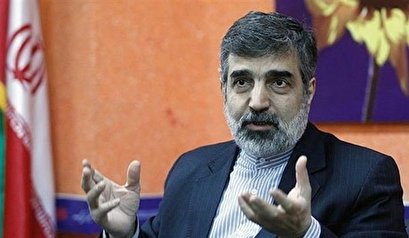TEHRAN, Sept 03 -Spokesman of the Atomic Energy Organization of Iran (AEOI) Behrouz Kamalvandi warned that if European states drag their feet in supplying Tehran with 20% enriched uranium, the country enjoys the capability to resume its production within 2 days.
 TEHRAN, Young Journalists Club (YJC) -"If the signatory states to the nuclear deal delay selling the 20% (enriched nuclear) fuel, it is Iran's right to provide its needed fuel," Kamalvandi said on Tuesday.
TEHRAN, Young Journalists Club (YJC) -"If the signatory states to the nuclear deal delay selling the 20% (enriched nuclear) fuel, it is Iran's right to provide its needed fuel," Kamalvandi said on Tuesday.
"If the Islamic Republic of Iran decides, it can have 20% enriched fuel within one to two days," he added.
Kamalvandi, meantime, said that Iran has not made any compromise on its heavy water other than what has been stated in the nuclear deal.
He also dismissed any secret talks between the AEOI and Washington other than the negotiations which were held within the framework of the nuclear deal.
His comments came two days after Chairman of the Iranian Parliament's National Security and Foreign Policy Commission Mojtaba Zonnour called on the government to increase the level of its enriched uranium to 20% and install the IR6 and IR8 centrifuges as a third step in scaling down its undertakings under the nuclear deal if the EU failed to do its commitments.
"We can adopt several serious measures in the upcoming third step (to modify nuclear deal undertakings); one of them is continuing the recent increase in the level of enriched uranium from 3.67% to 4.2% in a move to enhance it to the 20% level and develop the necessary deterrence (against Europeans' inaction)," Zonnour said on Sunday.
He also described increasing the volume of enriched uranium, installation of the advanced IR6 and IR8 centrifuges, restoring work on the construction of Arak heavy water reactor based on its past design, decreasing Iran's inspection undertakings to the level required by the International Atomic Energy Agency (IAEA) rules and suspending the voluntary implementation of the Additional Protocol to the Non-Proliferation Treaty (NPT) as other options before Tehran.
Zonnour underlined the necessity for the government to take multiple steps in the third phase rather than taking one single step every two months, noting that the next step should give Iran the necessary deterrent power against the Europeans' inaction.
Washington withdrew from the internationally-endorsed 2015 nuclear deal with Iran on May 2018, reimposed the toughest-ever sanctions against the country and started a plan to zero down Tehran's oil sales.
Under the nuclear agreement reached between Iran and six world powers in July 2015, Tehran undertook to put limits on its nuclear program in exchange for the removal of nuclear-related sanctions.
Yet, Iran continued compliance with deal, stressing that the remaining signatories to the agreement (specially the Europeans) had to work to offset the negative impacts of the US pullout for Iran if they want Tehran to remain in compliance. The Iranian officials had earlier warned that the European Union’s failure in providing the needed ground for Tehran to enjoy the economic benefits of the nuclear deal would exhaust the country's patience.
Almost a year later, however, the EU failed to provide Tehran with its promised merits. Then, the US state department announced that it had not extended two waivers, one that allowed Iran to store excess heavy water produced in the uranium enrichment process in Oman, and one that allowed Iran to swap enriched uranium for raw yellowcake with Russia.
Until now, Iran was allowed to ship low-enriched uranium produced at Natanz to Russia before it hit the 300-kg limit and the US measure leaves no way for Tehran other than exceeding the ceiling for storing the enriched uranium in violation of the 2015 nuclear deal.
Also, the United States would no longer waive sanctions that allowed Iran to ship heavy water produced at its Arak facility beyond a 300-ton limit set in the 2015 nuclear deal to Oman for storage which again forces Tehran to store it inside country in violation of the nuclear deal.
In return, Iran's Supreme National Security Council (SNSC) announced in a statement on May 8 that the country had modified two of its undertakings under the JCPOA in return for the US abrogation of the deal and other signatories’ inability to make up for the losses under the agreement, warning that modifications would continue if the world powers failed to take action in line with their promises.
Source:farsnews
 TEHRAN,
TEHRAN,